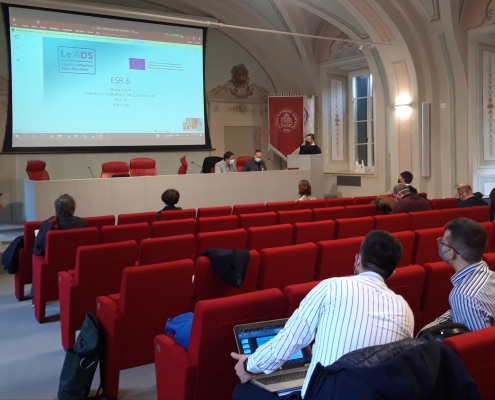LeADS trains the new generation of LEgality Attentive Data Scientists required by the challenges of the data economy and the unfolding of the digital transformation scoping in the fields of computer science, law, economics, statistics, management, engineering, policy studies, and mathematics.
LeADS knowledge triangle & ESRs employability
LeADS’s training programme is structured in six modules and tailored to the ESRs’ profiles and projects. The training programme also provides a strategy to deal with, and smoothly integrate, its interdisciplinary components as to make accessible advanced Computer Science research to Social Sciences graduates and Law research to Computer Science graduates. This strategy consists of three levels of integration. The first level of integration focuses around joint groups and includes approaches that aim to simply mix ESRs together and give them an initial experience of other worldviews. Second level integration is more intensive and focuses on developing joint science questions and enhancing the ESRs’ capacity to understand and synthesise alternative systems and methods into their own work. The third level of integration aims to foster active interdisciplinary exchange through joint research with case-study as a focus.
Courses will be regularly offered in English by the academic partner institutions; secondments at academic and industrial or regulatory entities; and individual project mentoring offered by both academic and non-academic participants. The three levels unfold in the training modules. The general training modules along with the transversal IT training module, which are fundamental in the integration protocol for both Computer Sciences and Social Sciences graduates, are co-taught by all the participating institutions. Each module is fully multidisciplinary and designed to involve both academics and non-academics to ensure the most effective interaction of the different professional and educational backgrounds. It will increase ESRs’ hard and soft skills, leading to improved employability both in and outside of academia.
Overall, during the research and training ESRs will acquire two main sets of skills. The first one relates to the hard knowledge of data scientists enriched with the needed knowledge taken out of social sciences and law in particular. Students will be exposed to algorithms and methods at the frontier of the State-of-the art, building analytical processes in different domains on behavioural and social mining.







